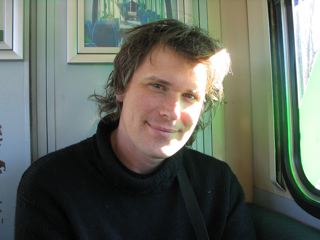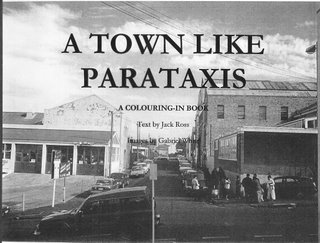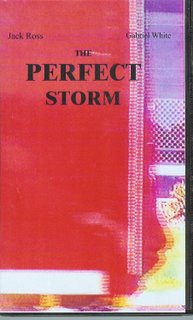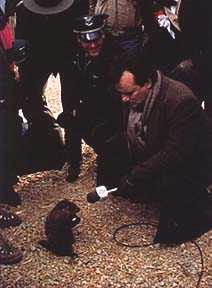 [Gabriel White - photo by Lies Vandesande]
[Gabriel White - photo by Lies Vandesande]I remember back in the late seventies there was a lot of controversy because Richard Ellmann’s edition of the
Selected Letters of James Joyce made public a few of the rather frank epistles he’d written to his wife Nora. I seem to recall a passage along the lines of how much he wanted to “fuck his little fuckbird’s cunt,” but it’s been a while since I checked them out.
An article I read at the time by some American smartarse began by debating the matter fairly solemnly before concluding that all obligations of decency and respect to the departed had to bow down before the sacred duty of giving the rest of us a good laugh. The author then went on to fabricate a series of similar letters by similarly grand men and women of letters (Hemingway, Faulkner, Gertrude Stein etc.)
Gabriel White’s latest video project
Aucklantis is a fucking good laugh. That’s not all it is, of course, but isn’t that enough to be going along with? I mean, how many successful pisstakes
are there out there that one can afford to neglect one?
If you don’t believe me, check out the sample
here.
Gabriel’s been back in Auckland now for almost a year. He brought back a lot of video footage and a lot of interesting ideas. Some of those ideas will see solid form soon (hopefully) in a DVD / book called
Tongdo Fantasia, part of which is already available on his new trial
website. It takes the form of a talking-head travelogue filmed in Korea, but the setting could really be anywhere. Gabriel’s method is to weave strange thoughts and associations around everyday objects as he talks to camera – banality is his domain, unexpectedness his stock-in-trade. He stalks the city like a latter-day Baudelairean
flâneur, weaving a complex meditation on the bizarrerie of the ordinary lives and landscapes we take for granted.
The packaging and the ideas have evolved somewhat, but one can still see a definite continuity with the two projects we worked on together:
A Town like Parataxis: A Colouring-in Book (Auckland: Perdrix Press, 2000)

was a collection of poems by me with photos by Gabriel. It’s now almost unobtainable, as we only banged out a hundred or so copies on some institutional xerox machine before we got caught. The pictures, though, are still a miracle. Gabriel had a theory at the time that simple colour snapshots blown up to A4-sized black-and-white would show strange complexities of texture and design. The results certainly bear him out. That carwash looks like the gates of hell to me.
The Perfect Storm (Auckland: Perdrix Press, 2000)

was an extension of the method to video. [That one I do have some copies of, if anyone’s interested (price $NZ10 plus $5 postage & packing)]. The Public Library catalogue described it as “poems read by Jack Ross set against Auckland landscapes” which about sums it up. I remember viewers tended to spend their time speculating where we’d shot particular bits of film, rather than noticing the strange dance of the cars around the roundabout, or the peculiar costumes of the boys crossing the street outside McDonalds. In a sense it was too obvious for anyone to see it. Once they’d worked out that there was no real continuity between the text and the pictures, they lost the ability to see what we wanted to point out: the hauntedness of the everyday.
Aucklantis seems to me a step beyond anything Gabriel has done before because the tone has shifted just a notch. His decision to look at Auckland as a tabula rasa, a blank slate literally anything can be written on, works because it’s so hysterically funny. It’s hard to imagine anyone taking seriously Gabriel’s descriptions of how to paint a rock grey or how to open a blank account, and yet – like the best stand-up – they make you see things, all of a sudden, in a new light.
Gabriel’s work is reactive, in the best sense. He takes the place he lives in and interrogates its peculiarities. His formidable erudition comes down, in these latest works, to one man talking on a moving screen – somehow he succeeds in making this the Platonic essence of cinema.
Of course I can’t help but see some connections between these ideas and my amnesia-novel The Imaginary Museum of Atlantis, which Gabriel helped launch earlier this year (I’m actually a bit peeved at not having thought of that “Aucklantis” portmanteau-word myself). What mainly strikes me about it, though, is the elegant simplicity of Gabriel’s solution to problems I could only approach by wrapping them in layers of crabbed discordant text. (For a video-clip of part of Gabriel's launch-speech -- filmed by my friend Rowan McCormick -- click here).
His latest work is so brilliant it can’t help but make the rest of us feel a little jealous. I take some pride, though, in having had some part in stimulating him to make this quantum leap. I think anyone who watches the finished work will see just what I mean.
Happy Birthday, Gabriel!
Gabriel White: Select CV
Shows and Performances:
· Sep 5, 2006: Video work “Aucklantis” included in Lazy Susan and Smelly John (St Paul St Gallery, AUT, Auckland). Curator: Mark Harvey. Artists: Sean Curham, Alex Monteith, Tessa Laird, Brydee Rood, Cat Gwynne, Linda T, Susie Pratt, Cushla Donaldson, Ben Holmes, Melissa Durbin, Aaron Hurley, Gabriel White, Mark Harvey.
· Aug-Sep, 2001: Video work for Adrift – Nomadic Art from New Zealand (Conical Gallery Fitzroy, Melbourne). Curator: Emily Cormack. Artists: Richard Lewer, Caroline Rothwell, Patrick Pound, John Pule, Mark Braunias, Brielle Hansen and Anushka Akel.
· Feb-Nov, 2000: Senior Tutor, Studio One Elam School of Fine Art.
· 1999-2000: Member of Rotaction, sound performance group, directed by James McCarthy. Performances at Lopdell House Gallery, La Mata theatre and the Adam Gallery. Awarded best multimedia performance at the Wellington Fringe Festival 2000.
· 1998-2000: Stop Gap, Auckland based poster installation project. Curator and artist.
Published Work:
· “I for an I,” Landfall 200 (2000): 187 [article]
· Review of Tessa Mitchell and Ben Holmes, "I am a Dark River." Pander 9 (1999): 40
· Review of Ronnie van Hout and Mike Stevenson, "Premillennial: Signs of the Soon Coming Storm." Pander 8 (1999): 36-37
· Review of Ross T. Smith, "Hokianga." Pander 6/7 (1999): 54-55
· Forgiven by the Moon, CD with Steve Abel, (self-released, 1998)
· Spacesuit, self-titled CD (released nationally, 1997)













